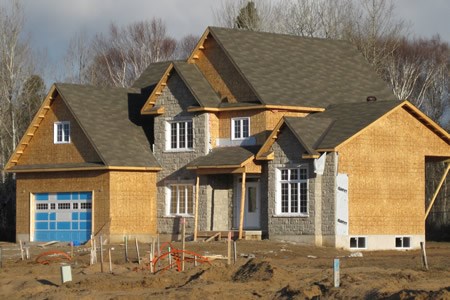Long the bane of builders in Greater Sudbury, city councillors voted April 24 to review their policy on development charges, with an eye on replacing them or changing how they are implemented.
The charges are fees developers must pay to build a new home, apartment building or commercial structure. Based on the principle that growth should pay for growth, builders are charged for the increased demands on city infrastructure (water, sewer, roads, etc.) that the new development will create.
For example, the city spent more than $60 million on a new biosolids plant, and estimated development charges could pay $4.8 million of that cost.
The city plans to recover $2.9 million of the $5.7 million it spent building the South End Library, while it estimates the fees would cover $12.8 million of the $125.2 million Maley Drive extension.
Development charges soared in the city in 2009, going from more than $3,000 to more than $14,000 for each single family home. But nickel prices were at record highs at the time and the city's housing market was red hot.
With Sudbury's economy slowing, councillors agreed in 2014 to delay a planned increase in the charges for two years, and delayed the increases again in subsequent years. Councillors have also implemented a system where developers can pay fees when homeowners take occupancy of the house, rather than at the building permit stage.
On April 24, they approved a motion from Ward 8 Coun. Al Sizer to have staff look for alternatives to the fees “or new approaches to managing development charge rates with an estimate of their financial impacts.”
Sizer said each councillor has heard from builders in the last four years about the negative impact the charges have on the industry.
“It's somewhat the elephant in the room,” Sizer said.
With a June 2019 review already planned for the policy, Sizer said it was important “to make certain we have investigated all possibilities” in “a real effort to stimulate growth in the economy.”
Ward 10 Coun. Fern Cormier supported the motion, saying developers face a range of costs when trying to build, not just development charges.
“There's no silver bullet answer,” he said, adding that Sizer's motion will encourage the city to “find creative ways to work with the development community.”
Also at the meeting, Ward 4 Coun. Evelyn Dutrisac convinced her colleagues to reverse a policy approved at budget time that charged owners of vacant lots in the city more in property taxes if their land was serviced with water and sewer infrastructure.
Dutrisac argued that it made no sense to introduce a charge on landowners for services they don't receive. They researched policies in other cities, and “none of them levied charges” for water on vacant land, she said.
“So it puts the City of Greater Sudbury in the minority,” Dutrisac said.
There are about 687 private lots in the city that would be affected by the bylaw, paying an average of around $500 more a year, bringing in more than $300,000 in new revenue.
Ward 7 Coun. Mike Jakubo said that while he recognizes that we all have to pay for the infrastructure, and having serviced lots makes the land more attractive, given the sluggish economy, the bylaw isn't spurring anyone to build structures on the land.
Cormier agreed, saying would make more sense in a hotter building market.
“But when you're fishing for sharks and all you get is minnows, you're doing something wrong,” he said.
The motion was easily approved. Since the new revenue wasn't factored in the 2018 budget, it won't affect the bottom line, councillors were told.




